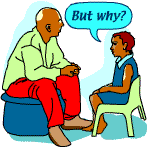Socrates
Created | Updated Sep 17, 2018

Very little is known of Socrates, and that which is known has been scraped together from various sources, most notably Plato's Dialogues, but there are also mentions of him in the works of Aristophanes and in fragments of Xenophon.
Early Life
Socrates was supposedly born in 470 BC, the son of Sophroniscus, a Greek sculptor, and Phaenarete, a midwife. The nature of his parents' existence is not entirely irrelevant either, because later on, Plato describes Socrates as a midwife who extracts the mental offspring of men in 'labour'. Through the use of his rhetoric, he might also have been said to sculpt, or manipulate an argument to reach a certain conclusion.
Socrates followed in his father's footsteps for a while after his education, sculpting such things as the Three Graces1. He joined and served in the Greek army and fought in a number of battles, namely the battles of Potidaea, Delium and Amphipolis.
Socrates the Teacher
Upon returning from his battles, Socrates turned his mind away from the material pursuits of society as a whole, and focused on deeper, more meaningful topics that we would associate with philosophy.
He believed strongly in the power of argument and discussion as a medium for educating people and conveying ideas across to an audience. This is one of the many reasons why we have nothing of his to read today, because he did not believe in writing as a powerful, educational tool. Instead he would wait in public places such as the marketplace or public baths, prompting others to answer his questions if they had time to listen. This is one of his most well-known activities.
Instead of 'educating' people in the modern sense, which he considered comparable to indoctrination, Socrates would prompt the minds of those he was talking to and let they themselves draw their own conclusions. He would merely ask the right questions to send them in the right direction. The word 'education' is derived from Latin meaning to 'draw out' - and that's what he did.
He claimed that he was not teaching people anything and that it was their own minds that did the thinking. To claim he knew anything would contradict one of his most well-known sayings:
'Wisest is he who knows he knows nothing'.
Because of this, the Oracle of Delphi said that Socrates was the wisest man in all of Greece.
Socratic Philosophy
His most common mental pursuits were the questions such as 'What is knowledge?' or 'How can we actually know things?'. In Plato's Theaetetus, Socrates is depicted as not reaching an answer to what knowledge is, but of what it is not.
But Socrates was particularly concerned with matters of an ethical nature. He believed knowledge to be good and ignorance to be bad, and that all knowledge is derived from what, in Plato's The Republic, is described as 'The Good'. Therefore anyone with supreme knowledge must be highly virtuous and a worthy leader, because their decisions are based on something which, in essence is purely good. Naturally some people with supposed knowledge use it for bad purposes, and Socrates says that this means only the most genuine philosopher would be fit to rule society. An entire section in The Republic is dedicated to the topic, 'The Philosopher King'.
The End
Due to the nature of Socrates' inquiries into the minds of the people of Greece, and thus through argument, changing their opinions on their society, Socrates was deemed a rebel against the political rulers of Athens. Someone so persuasive, who was actually convincing people that the system at the time ought to have been overthrown and replaced by the rule of philosophers, was a threat to the power of higher ranking citizens. This of course was rubbish, as Socrates was a man purely of the mind and had no political ambitions himself. He steered clear of politics due to what he thought was a 'divine intervention', which is precisely why he began philosophy instead.
It is argued that there was no real basis for putting Socrates on trial, but eventually he was accused of blasphemy against the Greek gods, for suggesting that there was something called Daemonion or, 'inner voice', in all of us. This was true, but it could have equally been called an inner monologue or suchlike. Nevertheless he was put on trial with this charge and that of corrupting the youth of Athens.
Due to his innate ability as a public speaker, the jury was only in favour of his death by an insignificant minority. But when Socrates suggested that he be let off with a small fine instead of a serious sentence, because of his importance to Athens and Greece as a nation, the jury was infuriated and subsequently the vote changed.
This great philosopher's last moments are recorded in Plato's Phaedo, where his conversations with his close family and friends are recorded.
Because of Socrates' attitude towards philosophical enquiry, he never wrote anything down, unlike modern philosophers such as Descartes and Bertrand Russell. It is only through Plato that we know anything of him and so it becomes hard to disentangle which were Plato's ideas and which were Socrates'. Nevertheless it is indubitable that he was one of the first, greatly influential philosophers in history.

